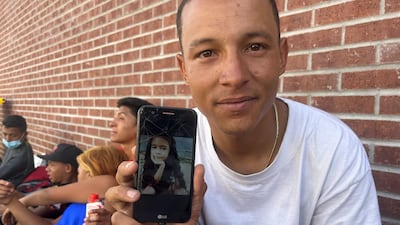Juan Angel Pabon from Venezuela has been camped in the street of Ciudad Juarez, Mexico, for the past two months with his two daughters, hoping to enter the US.
Mr Pabon, 52, who owned a grocery shop in San Cristobal in western Venezuela, left his country late last year because of the dire economic and political situation.
But his prospects of crossing into the US are slim, as the administration of President Joe Biden further restricted immigration laws on Friday, making it more difficult to seek asylum.
The US ended its use of Title 42, a sweeping pandemic-era rule that had allowed officials to quickly turn away hundreds of thousands of migrants seeking asylum at the US-Mexico border.
Under the new rules, migrants from Venezuela and several other countries can come to the US under a programme called humanitarian parole.
Anyone who arrives without an appointment or who do not pass an initial screening interview are deported to Mexico or their country of origin.
Migrants from eligible countries must first secure an appointment that can only be made using a smartphone app. They also need a US-based sponsor.
The app, migrants say, does not always work and there are hardly any appointments on it.
Mr Pabon's wife was able to book an appointment only to find out on the day that it was only for her.
“We put in the application for the whole family but when the appointment came something went wrong, and it was just for her,” he told The National.
Mr Pabon has been sleeping in a small tent with his daughters, aged 14 and 12, hoping to get appointments for them.
“It’s been very uncomfortable ensuring our daily subsistence and sanitary needs,” he said. “I need my daughters to be joined with their mother.”

Janese, 22, has been staying in a nearby tent with her husband and daughter Joylemar, four.
She left Venezuela back in February and arrived here a month ago. She says she is waiting to get her hands on a smartphone so that she can make an appointment.
“If that doesn’t work, we will have to go back to Venezuela,” Janese said. “I can’t stay here.”
A few kilometres away, more than 1,000 migrants queued near one of the gates along the sprawling US-Mexico border, hoping to cross and claim asylum before the expiration of Title 42.
Families with small children lined up on one side, single men on the other.
To arrive at the queue, migrants crossed a shallow river in Ciudad Juarez and then entered through a gate or a barbed wire before turning themselves in to US border patrol officials.
“The vast majority of them are South and Central American, there are many Venezuelans,” said Fernando Garcia, the executive director of the Texas-based Border Network for Human Rights.
“What I’m concerned about is that they don’t know what they’re going to be facing because there is a lot of misconception and misinformation about what is this border and what is happening when they are being processed.”

Dozens of those who have crossed into the US in recent days have congregated outside the Sacred Heart Church in the El Paso city centre.
Many are from Venezuela, most are young. Sometimes, they kick a football or chat with volunteers who come by. The late spring weather has been mild, making sleeping outside a pleasant experience, they say.
Several times a day, cars or lorries come by carrying donated food, which they look forward to.
Dozens more people are sheltering in an annexe by the church, most of them families.
Most are unaware of the fraught politics and policies around them. They say they had to leave behind the poverty and instability of their homeland in search of better opportunities.
Most have gone on months-long journeys that have taken them through the Darien Gap, the notoriously dangerous jungle that connects Colombia and Panama.
Angi, 22, is one of a few women camping.
Like many of the migrants outside the church, she is from Venezuela, which she had to leave behind because “there were days we didn’t have any food”.
Angi says she arrived a few days ago after spending eight days in US detention. But her journey from Colombia, where she had been living for two years, began in September.
“It was hard, the [Darien Gap] jungle and Mexico. There were times where it was dangerous,” she told The National. She made the journey with her younger cousin.
Angi has two children, aged five and three. She left them behind with their father in Colombia.
She said she wants to work in a kitchen as a cook.
“My dream is to study and work, and bring my children so that they could have what I couldn’t,” Angi said.
Victor Manuel, 22, arrived a day ago. He had been living in Colombia for eight years, where he worked as a carpenter.
He says he left Venezuela at the age of 14 because the situation was very dire, and he could not see a future for himself there.
“They gave me my papers yesterday, that calmed me down a bit, and I’m going to Denver, Colorado, tomorrow”, where he has several friends, he says.
He hopes he will find a good job and eventually bring his family.
Jose, 27, arrived two days ago after spending 13 days in US detention. He spent seven years living in Colombia where he earned a living selling fruit from a cart and collecting bottles for recycling.
“I found work within two weeks of moving to Colombia,” he said. “It was fine but xenophobia there makes it difficult to go anywhere in life.”
Jose has a 10-year-old son he left behind in Venezuela. He is no longer with his son’s mother and met another woman nine years ago.
She is Venezuelan and already in Chicago. He said he wanted to join her and get married.
Jose said a plane ticket to Chicago costs about $120, and he only has $70.
“So I am $50 short,” he says, taking out a Ziplock bag of cash from his pocket.
But he said he hoped that he would be able to travel soon.
“Every change comes at just the right time,” Jose said.









